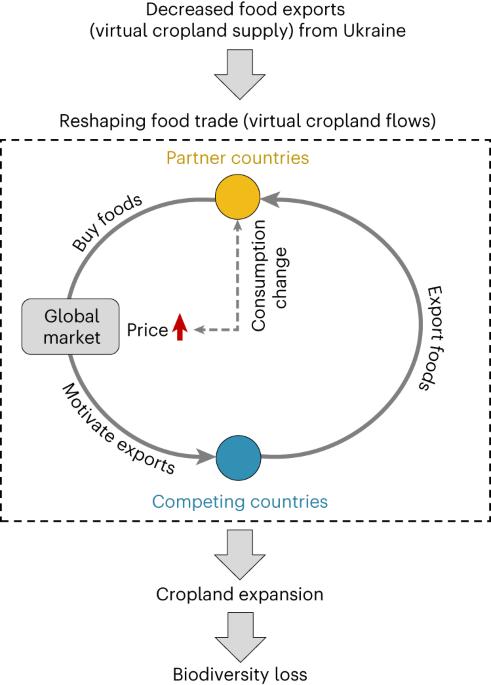俄乌战争对全球耕地扩张和生物多样性的远程耦合影响
IF 27.1
1区 环境科学与生态学
Q1 ENVIRONMENTAL SCIENCES
引用次数: 0
摘要
俄乌战争正在影响全球粮食系统,可能引发全球耕地扩张,进而导致远离战区的生物多样性丧失。为了量化这种对生物多样性的影响,我们模拟了在不同战争情景下国际虚拟耕地流的重塑所引发的全球耕地扩张,并进行了生物多样性影响评估。结果表明,与 "无战争 "情景相比,在基线情景(乌克兰出口减少 33.57%)下,战争将导致额外的 848 万公顷耕地扩张。这种耕地扩张对美国、西班牙、法国、印度和巴西等国的生物多样性影响最大。与基线情况相比,俄罗斯停止参与 "黑海谷物倡议 "将导致耕地扩大和生物多样性损失翻倍。如果冲突进一步恶化,即俄罗斯和乌克兰不再出口,耕地扩张和生物多样性丧失将分别增加 2.9 倍和 4.5 倍。这些研究结果表明,有必要采取积极措施来减轻这场战争对生物多样性的影响,并建议实施 2020 年后全球生物多样性框架的行动应考虑到冲突对生物多样性的潜在影响。乌克兰战争对全球粮食系统的影响具有多种可持续性影响,这些影响还有待研究。本研究模拟了战争可能导致的全球耕地扩张,并提出了生物多样性影响评估,显示了受影响最严重的国家。本文章由计算机程序翻译,如有差异,请以英文原文为准。

Telecoupled impacts of the Russia–Ukraine war on global cropland expansion and biodiversity
The Russia–Ukraine War is impacting global food systems, which may trigger global cropland expansion and consequently lead to biodiversity loss far from war zones. To quantify such impacts on biodiversity, we simulated the global cropland expansion provoked by the reshaping of international virtual cropland flows under different war scenarios and conducted a biodiversity impact assessment. The results indicate that, in the baseline situation (33.57% reduction in Ukraine’s exports), the war would result in an additional 8.48 Mha of cropland expansion compared with the ‘no war’ scenario. This cropland expansion would impact biodiversity most in countries such as the United States, Spain, France, India and Brazil. The cessation of Russia’s participation in the Black Sea Grain Initiative would lead to a doubling of cropland expansion and biodiversity loss compared with the baseline situation. If the conflict deteriorates further, that is, no exports from Russia and Ukraine, cropland expansion and biodiversity loss would increase by up to 2.9 and ∼4.5 times, respectively. These findings highlight the need for proactive measures to mitigate the impact of this war on biodiversity and suggest that actions to implement the post-2020 Global Biodiversity Framework should take into account the potential impacts of conflicts on biodiversity. The impacts of the war in Ukraine on global food systems have multiple sustainability implications that are yet to be examined. This study simulates the potential war-induced cropland expansion worldwide and presents a biodiversity impact assessment, showing the most affected countries.
求助全文
通过发布文献求助,成功后即可免费获取论文全文。
去求助
来源期刊

Nature Sustainability
Energy-Renewable Energy, Sustainability and the Environment
CiteScore
41.90
自引率
1.10%
发文量
159
期刊介绍:
Nature Sustainability aims to facilitate cross-disciplinary dialogues and bring together research fields that contribute to understanding how we organize our lives in a finite world and the impacts of our actions.
Nature Sustainability will not only publish fundamental research but also significant investigations into policies and solutions for ensuring human well-being now and in the future.Its ultimate goal is to address the greatest challenges of our time.
 求助内容:
求助内容: 应助结果提醒方式:
应助结果提醒方式:


